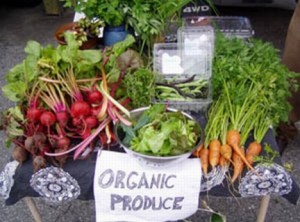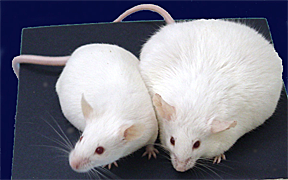Organic or Conventional: Is There a Difference?
Filed under: General Health, Nutrition
Unfortunately evidence does not seem to provide a conclusive answer. Some research shows that organic produce have higher vitamin, mineral and antioxidant content. Other research shows the nutritional difference between organic produce and conventional to be insignificant. In reality there may be much more to the story than simply the nutrient content: the enormous amounts of pesticides, herbicides and fungicides conventional farmers use to keep bugs and weeds at bay.
Again some research has shown that the consumption of these chemicals in the amounts expected from daily produce consumption does not produce any harm, at least in the parameters covered in the study. Yet there is emerging research telling us a different story. Original research on the safety of these chemicals did not take into account possible weight-regulation disruption. Many of these compounds mimic hormones in our body, disrupting the endocrine system and the delicate balance of weight maintenance and self-regulation. The combination of dozens of pesticides, herbicides, fungicides, hormones, antibiotics, xenoestrogens and the countless other chemicals we encounter everyday might be playing a much greater role in this obesity epidemic than was ever previously realized.
To illustrate this point more clearly is the fact that there is growth in obesity in a segment of the population that can’t be explained by over indulgence, poor food choices or a sedentary lifestyle: infants. The Harvard School of Public Health reported that obesity in infants under six months had risen 73% since 1980.
To explain this peculiar phenomenon, recent research has focused on the possibility that chemicals present in our environment and especially prenatal exposure to those chemicals increases risk of obesity. Many of these chemicals were once or are currently deemed safe, but this new research is showing a different story.
This recent research has been done on mice and rats, with exposure to compounds like BPA (in hard plastics), organotins (in PVC pipes, fungicides and pesticides) and atrazine (a common herbicide). It was found even with very low level exposure, and without a change in calorie intake or physical activity level, that the mice or rats exposed to the chemicals were up to 20% heavier with 36% more bodyfat (depending on the chemical) than mice not exposed. The exposed mice had decreased basal metabolic rates, increased body weight, increased intra-abdominal fat and insulin resistance; a recipe for disaster.
Clearly the effect of some, if not all, of these compounds in our food supply is contributing in some capacity to this obesity epidemic. Not to mention that due to toxic run-off in the Mississippi River from conventional agricultural and animal production there is a dead-zone in the Gulf of Mexico that ranges from 6,000 to 8,500 square miles (about the size of New Jersey) where oceanic life can no longer be supported. The chemicals cause the gulf to be a hypoxic wasteland where only algae can proliferate, wreaking havoc on the surrounding environment, as well as the fishing industries. Even worse, this is the most well known, but only one of approximately 250 dead-zones like this around the world.
The fact of the matter is that there is still too little known about many of the chemicals used in conventional agriculture. Ones once deemed safe for human consumption are now being found to cause problems in weight-regulation, insulin sensitivity and endocrine disruption. This is why I recommend you purchase as many organic, sustainably farmed fruits, vegetables and other foodstuffs as possible. Removing these dangerous chemicals from our food supply, and from your body, might go a long way in improving health, energy and weight regulation.
Having said all that, I certainly understand as well as anyone the limits you can have on your food budget, which can make buying organic produce difficult. To help you prioritize your organic food choices, whether you are on a budget or you would simply like to know which type of produce has the highest pesticide residues-and which do not-the following guide from the Environmental Working Group will help. I recommend buying organic at least for the 12 Most Contaminated. Regardless of whether the produce was conventionally grown or organically, I also recommend you thoroughly wash before eating with a fruit and vegetable wash.
12 Most Contaminated
1. Peaches
2. Apples
3. Sweet Bell Peppers
4. Celery
5. Nectarines
6. Strawberries
7. Cherries
8. Pears
9. Grapes (Imported)
10. Spinach
11. Lettuce
12. Potatoes
12 Least Contaminated
1. Onions
2. Avocado
3. Sweet Corn (Frozen)
4. Pineapples
5. Mango
6. Asparagus
7. Sweet Peas (Frozen)
8. Kiwi Fruit
9. Bananas
10. Cabbage
11. Broccoli
12. Papaya
I didn’t even begin to cover other realms of the topic, like different types of organic, such as industrial organic. Another topic for another day.
Check out the BSP Training & Nutrition Newsletter!
You will get immediate access to:
- Weekly updates and exclusive content.
- The 20-page report "The Truth About Saturated Fat & Cholesterol."
- Become more awesome!
Posted on April 12th, 2010 by Brian St. Pierre
8 Comments







April 12th, 2010 at 3:36 pm
Brian,
Due to things like “bioaccumulation” and “biomagnification” in the food chain, would you say that if having to prioritize, it is far more critical to worry about the source of animal products than whether or not produce is organic or conventional? Ideally we’d have the best on all fronts, but if I understand things correctly, even conventional produce wouldn’t yield nearly the potential toxic loads on the body that “poorly” sourced animal products can.
On a side note, is there any particular method for washing fruits and veggies that you do recommend and use yourself?
April 12th, 2010 at 6:47 pm
Brian,
Do you know of any study that directly links the accumulation of pesticides and herbicides in produce and the antibiotics in meat, dairy, with infant obesity? Possibly something we need more research on?
April 15th, 2010 at 6:01 am
[...] to induce obesity in infants with chemical exposure. There is certainly growing evidence as I noted here, that these chemicals can contribute to obesity in infants. In mice and rats they most certainly [...]
April 30th, 2010 at 8:46 am
[...] In many ways this also piggy backs on the thought that consuming the pesticides, herbicides and fungicides thought to be obesogens during pregnancy can alter the bodyweight and bodyfat of those children. I wrote an entire blog on that topic. [...]
May 12th, 2010 at 3:55 pm
Cool post. I have been looking into the same issue of chemical exposure.
May 13th, 2010 at 12:13 pm
Matt,
Glad you liked it.
May 4th, 2011 at 1:48 pm
[...] Organic or Conventional: Is There a Difference? – ME! This is an oldie but a goodie, that I think is still a relevant topic. Maybe even more so with the ever increasing gas prices and the impact on produce prices and food budgets. [...]
May 5th, 2011 at 4:31 pm
Well put. I’m sending this to my family right now.